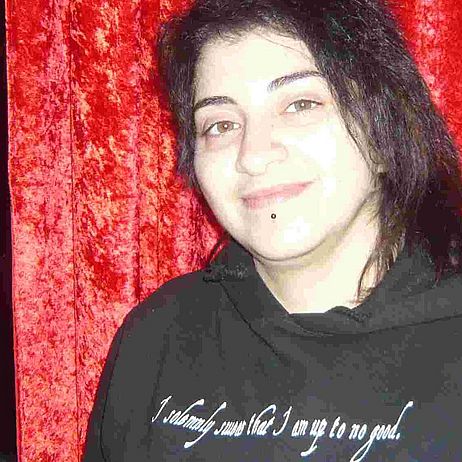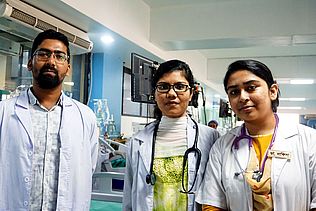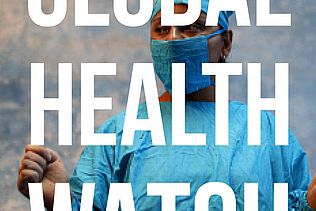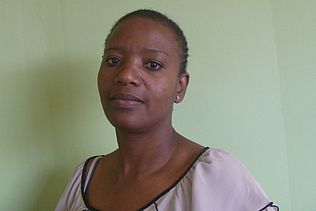Andreas Wulf (medico international):
Can you explain a bit the context of Marsa Center for Sexual Health and how this project has developed and what you see as your perspective of this project.
Diana Abu Abbas (Marsa Center for Sexual Health ):
The Marsa Clinic started as a project out of Helem Organisation.
Helem is an organisation that advocates for the protection of the Lesbian, Gay, Bisexual, Queer and Trans community in Lebanon. They are not registered as a legal NGO, because the registration process is still pending mainly because of the penal code 534 in Lebanon that prohibits “unnatural sex”, and that law is used against individuals who have same sex sexual relations.
So basically, Helem developed a Health Unit, and Marsa started off as a project of this unit to promote Sexual Health and the main services they used to offer were the free and anonymous HIV Testing, psychological counselling services and they used also a referral system for medical consultations for sexually transmitted infections. After a while, following the launch of the sexual health clinic which was supported by medico international, AFE and the WHO, the founders saw that there was a need for it to be expanded into a project that is more accessible for people from different sexual orientations and different gender identities, so for that matter, the sexual health clinic was developed into a sexual health center adopting the same services and offering some more. Thus the center was born, and it was named Marsa. Marsa in Arabic means the “dockyard”, which connotes the safe environment it offers. Marsa has been operating since 2010; it was launched officially in March 2011, which was when I joined the team.
At the moment, Marsa is supported by several organisations, mainly we had support from Medico International from the beginning, and we also have support from the WHO and the Arab Foundation for Freedoms and Equality (AFE) in Lebanon The services that we offer right now are the free and anonymous HIV counselling and testing and Hepatitis B and C testing, actually all of our services are anonymous and confidential and are offered for free or at subsidized prices.
In addition to the rapid test and VCT we also offer the medical services for the costs of seven dollars which is considered very cheap for a medical consultation in Lebanon and we also have a counselling program. The counselling program has a priority of clients who have sexual dysfunctions or problems getting comfortable with themselves with regard to their sexuality, gender or sexual orientation.
AW:
Can you explain a bit the reason for offering these services for sexual health?
DA:
The reason behind developing this center is because access to sexual health in Lebanon is not easily accessible, e.g. the gay and trans community in Lebanon suffer from a lot of discrimination, when it comes to seeking health care at doctors offices, mainly because it is still considered illegal in Lebanon and the person who is charged of being homosexual will possibly go to prison and pay a fine for it.
Also, the fact of being homosexual or transgendered is not acceptable on a social level.
Women too suffer from discrimination in Gynaecologist offices because they are not expected to have sex before marriage and most people would like to avoid the stigma that accompanies sexual activities before marriage.
<object width="560" height="315"><param name="movie" value="https://www.youtube-nocookie.com/v/PKQJcbokBaw?version=3&hl=de_DE&rel=0"><param name="allowFullScreen" value="true"><param name="allowscriptaccess" value="always"><embed src="https://www.youtube-nocookie.com/v/PKQJcbokBaw?version=3&hl=de_DE&rel=0" type="application/x-shockwave-flash" width="560" height="315" allowscriptaccess="always" allowfullscreen="true"></object>
AW:
So right now you see that the project, that started off from a project in the LGBT community is now expanding towards more broader society groups – was this the concept from the beginning?
DA:
There were definitely a need to develop the sexual health clinic from Helem so that it would be accessible to people from all different sexual orientations and gender identities, now it is open for heterosexual people – it was always open but now it is more public and people can come to the center comfortably without having the stigma of being gay so it is free of stigma, prejudices and the services are always confidential and anonymous. This is one of the most important aspects of having Marsa as the Sexual health center.
AW:
And it is located in the center part of Beirut?
DA:
Marsa is located in the Hamra area. Hamra is a vibrant area in Beirut, which is the capital of Lebanon. Hamra is qualified as a business center, there are around 5 to 6 universities in Hamra, it also has a major shopping area, so it is attractive in many ways to youth, and to the clientele that is slightly older, so now we are reaching out to many more people and this is helping us to provide the services that are needed by the community.
AW:
So that you also see mostly Beirutians coming to your center or is it also for other people coming from other areas of Lebanon?
DA:
The clientele is mainly from Beirut but we also have clients who come from different areas of Lebanon, we have clients coming from the south, coming from the north and from Mount Lebanon and we are the first sometimes to receive clients from such remote areas because in those areas they do have centres to provide VCT services anonymously, but Marsa has been successful in attracting those clients mainly because of the reputation we have and the feedback we are getting from our clients who are referring their friends to us as clients.
AW:
So the reaction of the professional health community in Lebanon – is this positive and do they interact easily with you or do you feel you are a bit of an exotic project?
DA:
Since we started we had many positive feedback about Marsa, especially from the professionals in the community, we know this because we have a lot of networking going on with professionals in the field, with Gynaecologists and doctors of infectious diseases and family doctors. We also have contacts with many organisations who are working in the same field providing health care and some organisations working with youth, and some others; we also have collaborations with feminist organisations. And we publish our reports on a monthly basis and they are sent out to those professionals on a regular basis and we always get feedback from them and they are always encouraging and sending suggestions and we always take them into consideration, and their feedback is very important to us because that’s how we know how we can improve our services to the community.
AW:
And you also – as I know – you can also refer patients when there is a specific need, you can refer them to these professionals?
DA:
Yes. we can refer patients to other professionals, in case the care we provide is not enough for them, and they need care in a more specialized manner, for example: when it comes to the counselling programme, we have therapists and counsellors at the center but in case we have a case that needs a psychiatrist, we have a further referral system. the medical doctors at the center are family doctors, so in case a client needs further follow-up with a dermatologist or a gynaecologist, we have access to those professionals, and for example when we have a client who comes in and is positive for HIV, we also have referral system to doctors who are specialized in infectious diseases and all our clients who get referred to other professionals get treated for free.
AW:
Do you do already or do you plan to work in a more outreach perspective? – Right now you receive the clients at your center or do you also do outreach, awareness raising or counselling?
DA:
So far the number of our clients have been growing steadily and right now we have plans to reach out for more people so that they can become aware of the importance of the care for sexual health, for example, we have plans now to outreach to people in pubs, especially in Hamra because we have over 50 pubs who are open in Hamra, so if we do a simple advertisement in the bathroom we can reach a lot of people, because it is a private place, so people will feel comfortable to take the number of the center and come to us to get tested or to see a doctor. We also have plans to do awareness campaigns in universities through our medical team.
AW:
You are cooperating with the National AIDS Programme also, don’t you?
DA:
Yes, all of our efforts have been in collaboration with the NAP, they are supporting us technically, by providing the HIV kits, and condoms for distribution for free at the center and also in the outreach programme.
AW:
This sounds like a very rapid expansion of your work. Do you also plan to work with volunteers who would support your work? Can you tell something about this?
DA:
I should talk a bit about the structure at Marsa:
Mainly we have two members of the staff who are full time employees, we also have medical doctors who are coming on part time basis , we also have counsellors who are coming on a part time basis, and most of the VCT officers at Marsa work on a volunteer basis, and this is very important for us, since we started we haven’t been able to provide a salary for every person working at Marsa and actually we have a dietician and the counsellor for people living with HIV is also working on a volunteer basis , we have a Reiki practitioner and recently we have a doctor who works in psychosexual therapy and couple therapy and she will also join the team on a volunteer basis – so it is very important for us that people are willing to work for us for free and supporting Marsa and the community.
Of course later on we have plans to provide them with a salary but for now the services are ongoing as it is.
AW:
And I find it also interesting that you have friends of Marsa in other countries that are supporting you financially, doing fundraising activities.
DA:
Actually we have been very lucky with our friends since people have been approaching us to promote Marsa in fundraising events in different parts of the world, for example in June during the Pride Parade season, we had friends who organized a big party, a fundraising party in Madrid, Spain, that raised a big amount of money. It helped sustain funds for Marsa for the past few months, we have also been approached by some friends in New York City through a brunch, this was also very successful and we have an athlete who runs marathons To raise awareness about LGBT rights and this year he decided to donate the funds he raises to Marsa.
AW:
And then, what is another feature that Marsa seems to be a lighthouse in the whole Arab region, so it is not just Lebanese people who know about Marsa already but also people from around.
DA:
It is funny that you mention the word lighthouse because the new website we are designing our background image is a lighthouse. We have been getting clients from the all over the Arab region and they have been referred to us through other clients or through online searches. Some of those clients come from countries that don’t not accept being HIV positive at all. And some others are afraid of undergoing the HIV test because it’s not always available as an anonymous service. Even STI screenings are not easy to attain without any stigma, and that’s how we try to be helpful and follow up with them in the difficult circumstances they are suffering from.
AW:
Would you say a word on your own history, how you came to join Marsa? What is your background?
DA:
Actually I’ve been an activist for many years, and I haven’t been a member of Helem, but I have had been in close relations with them. I had been following up with the members since the Helem health clinic days and I had expressed interest in volunteering for the project. When the official launch was near I was offered a job there as the management coordinator. Given my experience in NGO management and my communication background, the founders thought I would be a suitable candidate for the job since I can both manage my experience in the NGO field and in the media to help to promote Marsa, in addition to my communication skills that would come very handy in dealing with clients.
AW:
But it is your first work in a health setting, this is new for you?
DA:
Yes, it is new and it is very exciting, since it is the first project of its kind in the region and personally, as a staff member, I am very proud of working in Marsa, it will be the model for other projects in the region.
AW:
Can you have a look in the future? How you wish to see Marsa in two years or five years time? What are your plans?
DA:
First, in a few years I would loved to see different of branches all over Lebanon because seeing that people need to come to us to receive the service, it would be good to have branches in the five provinces of Lebanon to provide the services for them, and allow me to say that , as we are doing such a good job I which we could also open branches in the region, well at least help other groups to open their own sexual health center and help them to start a Center that could be suitable within the laws that they have in their countries. We know that Arab countries are a bit conservative so maybe we could customize the Marsa model into something suitable for them.
AW:
Do you have already contacts with people in other countries who might be able to take this forward?
DA:
I think the contacts we have with a feminist group in Egypt, called Nazra and recently we met with some other National Aids Programmes in the region and they were interested in the Marsa Model. We haven’t been in contact officially but there is interest in it.
AW:
So there are big plans for the future, I wish you all the best, thanks a lot.
DA:
In the name of the Marsa Team I would like to thank medico international because they have been supporting us from the beginning , it is not just the financial support , it is the support behind the management and how to enhance our services , and how to help Marsa grow as a sexual health center.




